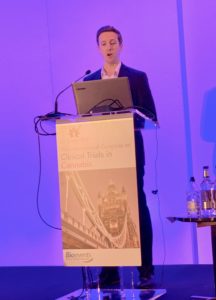#50 PRIME TIME: We’re From the Government and We’re Here to Help You
The International Congress on Clinical Trials in Cannabis was held in London, England, Oct. 24-25, 2019. Approximately 130 individuals from a half dozen countries attended. Mary’s Prime Time Blog will explore several of the presentations from the conference in this and future blogs.————————As the cannabis prohibition disintegrates globally, it is fascinating to watch how various countries are unraveling the complicated ball of wax created by decades of banning access to, and research on, the cannabis plant. At a recent conference in London, this writer learned a few things about how Britain is handling medical cannabis and about a UK government agency known as NIHR — National Institute for Health Research.Some background on Britain’s medical cannabis path. Just as it was in the U.S., it was patient efforts to acquire legal cannabis that elevated the controversy to the point of effectuating change. But Britain does not have independent States, so the ballot box as a tool was unavailable to British patients. Nevertheless, starting in the 1990s, patients began publicly demanding legal access to cannabis. Elizabeth Brice, an MS patient from Leeds, did a spectacular job of educating the British public about cannabis. She also formed an alliance with Dr. Geoffrey Guy, founder of GW Pharmaceuticals, which led to the development of the first approved, cannabis-derived medicine, Sativex, specifically for MS patients. It was a long slog, but in 2010 Sativex (nabiximols) was approved as a botanical drug in the UK.Obviously the battle wasn’t over. Brice died in 2011 at the age of 54 and the fight went quiet for a while. But things heated up again with the introduction of CBD as a potential treatment for pediatric epilepsy. The movement once again had focus, compelling focus, and in the summer of 2018, after merciless press articles accusing the government of cruelty towards children with intractable epilepsy, Britain changed a few regulations and declared medical cannabis to be legal. Patients and the families of patients who required medical cannabis were thrilled. But after changing some regs, the entire problem was dumped onto NICE—the National Institute for Health and Care Excellence. (If, like me, you wondered how they got to NICE when the acronym should really be NIHCE, the answer lies in the preceding agency which was named the National Institute for Clinical Excellence (NICE) but in 2005 it merged with the Health Development Agency. I suppose someone decided it was just, ahem, nicer to retain the old acronym.)NICE has kicked the cannabis can down the road a bit, approving Epidiolex and re-instating Sativex after it was removed from the NHS drug list a couple years back. However, it is fair to say that patients are still waiting and longing for something like the American or Canadian system which would give them access to full-spectrum cannabis. NICE, meanwhile, is clearly intent on derivatives. Patients are angry about the bureaucratic foot-dragging and continue to press for expanded access.It won’t be easy. In May 2019 the head of Britain’s National Health Service (NHS) declared that softening cannabis laws was a “big mistake” that would lead to an outbreak of “psychosis” among the nation’s youth. Needless to say, such comments were very disheartening to the patients who have lobbied hard for legal access. But there is another agency in Britain, this one tucked under the wing of the country’s Department of Health and Social Care, that offers a different entry point for those interested in developing medical cannabis. The aforementioned NIHR has a mission “to improve the health and wealth of the nation through research.” While the agency is somewhat analogous to the U.S. National Institutes of Health (NIH) in that it can approve research projects, it also takes a broader look at process by drawing in players beyond the research lab.

Theo Christie, Business Development Manager at the NIHR, presented an illuminating talk about his agency at the recent International Congress on Clinical Trials in Cannabis. What captured this writer’s interest was NIHR’s commitment to not only approve research but also to invest in the infrastructure and workforce of health care companies. Thus NIHR might approve a cannabis-based medical research project (not necessarily from a British company) and also work with the company to develop the facilities needed to support the drug, when approved. NIHR also engages the public, patients and carers in its decisions. Even more, NIHR will help a company find other sources of funding from the public, charities, and industry. Just recently it closed out a “theme call” for medical cannabis with results to be announced in 2020. This holistic approach makes sense if applied properly. While some might see such involvement as “meddlesome” there is the other side of the coin, a government agency willing to assist in the full development of cannabis-derived products. In today’s pharmaceutical market the start-up costs are largely prohibitive for even synthetic drugs. For a natural substance like cannabis the barriers are ridiculously high. It is not NIHR’s mission to tear down those barriers but it can help a motivated entrepreneur navigate the course. Such help is sorely needed. ❖
Next up: More from the International Congress on Clinical Trials in Cannabis, Oct. 24-25, 2019, London.The post #50 PRIME TIME: We’re From the Government and We’re Here to Help You appeared first on Mary's Medicinals.
